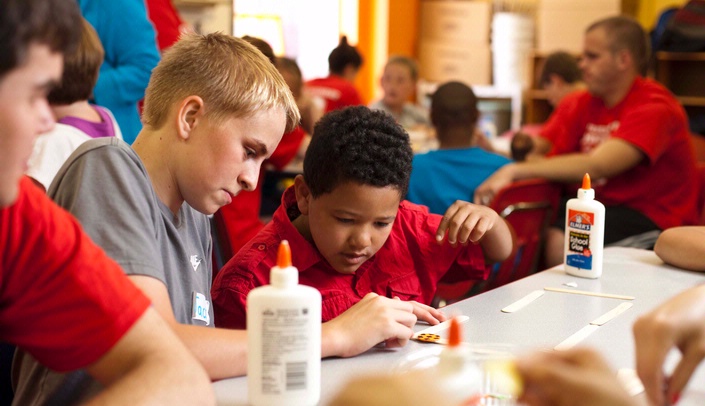The Munroe-Meyer Institute (MMI) at the University of Nebraska Medical Center has partnered with other organizations to highlight the work of Medicaid in Nebraska communities.
“Medicaid is vital to the wellbeing of many Nebraskans with disabilities,” said Sarah Swanson, community and family resource specialist for MMI and the liaison for the project at UNMC. “Unfortunately, this critical health insurance program is often poorly understood and stigmatized.”
The "Medicaid Works" photo project promotes an accurate picture of the many ways this essential program supports thousands of Nebraskans every day, Swanson said.
Funding for this project was awarded to Nebraska Appleseed from the Nebraska Planning Council on Developmental Disabilities and further supported with funding from the federal Administration on Intellectual and Developmental Disabilities. Other collaborators included the Arc of Nebraska and Disability Rights Nebraska.
Photographer Grace Young’s series of photos illustrate the importance of Medicaid for five families in Nebraska.
As depicted in the photographs and narrative, children and adults with disabilities rely on the Medicaid program to ensure their health, independence, financial stability, and overall quality of life.
“Each shoot left me overwhelmed by the amount of energy and dedication it takes to maintain an independent life while being a Medicaid advocate,” Young said. “I am so grateful to the families and individuals who allowed a stranger with a camera into their homes to document their lives. This experience left me with a far greater understanding and respect for those living with a disability.”
One of the people featured in the project was JaToya McIntosh, a single mother of two boys who suffers from a degenerative genetic condition affecting her lower limbs and progressively impairing her mobility
"Medicaid helped me beat the odds," McIntosh said. "I wasn't supposed to walk past 18. I am now 33 and still walking – limited, but I can do it. Medicaid has paid for my wheelchair, physical therapy, and the medicine I need. It was a large part of the reason I am still able to walk – that and my sheer determination.
McIntosh currently serves as an AmeriCorps member at MMI. Her youngest son, Jarez, also is affected by the condition.
"For people with disabilities, Medicaid is a lifeline to community living. It allows them to have the supports and services they need to live their lives as they wish." Swanson said. "Medicaid can pay for things private health care insurers won't. We felt this project was very important to help eliminate some of the negative stereotypes associated with Medicaid and to illustrate the various ways that Medicaid can be used to provide services and supports to individuals with disabilities and their families."
Other stories featured on the “Medicaid Works” project include:
- A woman with Ehlers-Danlos Syndrome, a disorder that severely affects her digestive system, lungs, and other body systems. Her 18-year-old twins were born prematurely and have inherited the condition. They struggle with epilepsy, asthma, and chronic joint pain. One has autism, and the other has partial hearing loss and mild cerebral palsy. A third child was born prematurely and requires a feeding tube for nutrition and for medications to treat her chronic kidney disease. Medicaid has covered the family’s significant health care costs, giving them the opportunity to focus on other meaningful pursuits.
- A woman who became disabled at the age of four after being crushed by a falling tractor tire while rescuing her older sister from the tire’s path. She went on to earn a degree from the University of Nebraska-Lincoln and continues to lead an active life. Medicaid has allowed her to maintain her independence throughout life.
- A man with Down syndrome who as a child was “kicked out” of several day care centers when the providers found it difficult to meet his needs. Once he was approved for a Medicaid waiver, he was able to access the services he needed to develop skills to control his behavior, enjoy his youth, and begin preparing for adulthood. Today, he participates in a waiver-funded supported employment program and receives feedback and praise from his supervisors at work. He also receives other waiver-funded support services and lives with his family. From his perspective, he is leading an “enviable life.”
- A teenage boy who contracted a septic infection caused by enterovirus as an infant. As a result, he suffered permanent neurological damage causing significant intellectual and developmental impairments. Two years ago, he underwent a liver transplant. Fortunately, the procedure was covered by the family’s insurance and the Medicaid Aged and Disabled (A& D) waiver. He lives at home, attends school and is surrounded by his many family members and friends. Thanks to the A& D waiver, his family and school staff is able to attend to his medical needs while he gets to remain in the community.
Swanson said others who have been helped by Medicaid are encouraged to go to https://neappleseed.org/medicaidworks and submit their stories.
For high-resolution images from the “Medicaid Works” display, or to conduct interviews with those involved in the project, contact Nebraska Appleseed Communications Director Jeff Sheldon at (402) 438-8853 or email jsheldon@neappleseed.org.
Through world-class research and patient care, UNMC generates breakthroughs that make life better for people throughout Nebraska and beyond. Its education programs train more health professionals than any other institution in the state. Learn more at unmc.edu and follow us on social media.
